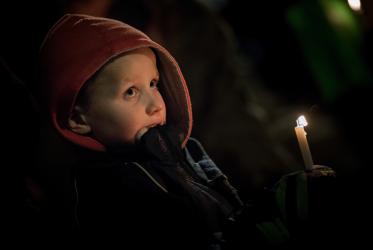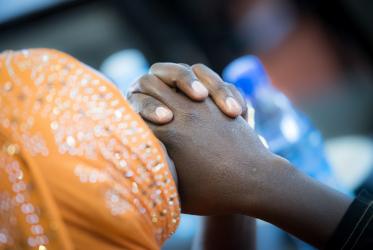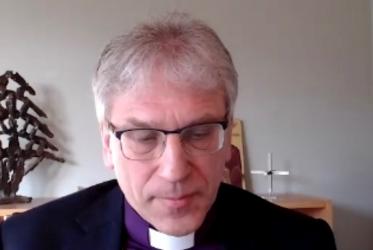World Council of Churches
CENTRAL COMMITTEE
Geneva, Switzerland
26 August - 2 September 2003
Applications for Joint Membership, Associate Council and IEO
At its meeting in February 2003 the Executive Committee decided to recommend the following applications to the Central Committee for its consideration and action.
Application for Joint Membership (Art. I of the Rules)
The Moravian Church in America, Northern Province, and the Moravian Church in America, Southern Province, which are founding members of the World Council of Churches and have been full members since 1948, are applying for the status of joint membership as Moravian Church in America. The application is made in the light of the Final Report of the Special Commission on Orthodox Participation in the WCC.
Proposed action: that the Central Committee receive into full membership the Moravian Church in America, substituting the previous full member churches Moravian Church in America, Northern Province and Moravian Church in America, Southern Province.
Applications for the status of Associate Council (Art. XI of the Rules)
2.1 Christian Council of Nigeria
The Christian Council of Nigeria was formed in 1929. Presently it has 14 member churches (6 of which are members of the WCC) and 6 member organisations. The Council has area committees in almost all the 36 states of the federation. It has two departments, the Institute of Church and Society and Daystar Press. The CCN is in the process of revising its Constitution. In the proposed new version the primary function of the Council is stated in these words: “To facilitate or establish a Christian church in Nigeria that worships one God in the Trinity of the Father, Son and Holy Spirit, and accepts the Scriptures of the Old and New Testaments”. The Mission Statement reads: “To facilitate and build the capacity of member churches that ensures a sustained Christian lifestyle, witness and transformation of the Nigerian society”.
Working relationships between the WCC and the Christian Council of Nigeria have been more intensive in the past than they currently are. This is partly due to the formation of the Christian Association of Nigeria in 1991, which includes the Roman Catholic Church and the Evangelical and Pentecostal churches and of which the CCN is itself a member. The CCN thought of itself as an associate body with the WCC until it discovered two years ago that it had to apply in order to obtain the status of associate council.
Proposed action: that the Central Committee recognize the Christian Council of Nigeria as associate council with the World Council of Churches.
2.2 Christian Council of Norway
The Christian Council of Norway is a relatively young body established in 1992. It has 15 member churches representing a wide range from Roman Catholic to Orthodox, Church of Norway, several foreign language churches, Free churches, Salvation Army and Pentecostal churches. The Council describes itself as “A fellowship of churches, Christian religious communities and parishes in Norway, worshipping and confessing one God – the Father, Son and Holy Spirit – as Creator, Saviour and Giver of Life, in accordance with the Holy Scriptures”. Its aims are 1) to promote understanding of ecumenical matters, 2) to promote contact and fellowship with international Christian communities, 3) to be a forum of opinion-shaping, and 4) to forward proposals regarding the rights of religious communities. Some of the issues the Council is working on are local ecumenism, immigration, women, youth, cooperation with NCCs in Central and Southern Africa.
The Christian Council of Norway has applied simultaneously for association with the Conference of European Churches, the World Evangelical Alliance and the World Council of Churches.
Proposed action: that the Central Committee recognize the Christian Council of Norway as associate council with the World Council of Churches.
2.3 Council of Churches of Porto Rico
On 11th November 2002 the Assembly of the former Evangelical Council of Porto Rico, which had been in existence for 96 years, decided to become the Council of Churches in Porto Rico. A new Constitution and Rules were adopted. The change of name came after a reflection process of eighteen months and reflects the resolution of the member churches of the new Council to express their ecumenical vocation and their desire to open the dialogue with other churches and denominations of various Christian traditions. The Council has redefined its vision and mission in order to be able to respond to the new needs and challenges which the churches are facing. The current member churches of the Council are: Methodist Church, Christian Church (Disciples of Christ), Baptist Churches, United Evangelical Church, Presbyterian Church Synod of Boriquén, Church of the Brethren, First Union Church and Second Union Church.
The decision of the Council of Churches of Porto Rico to apply for the status of associate council with the WCC is motivated by its recognition of the longstanding role of the WCC in the work for the unity and solidarity of the churches, and its desire to be more closely involved with the fellowship of the churches belonging to the WCC.
Proposed action: that the Central Committee recognize the Council of Churches of Porto Rico as associate council with the World Council of Churches.
2.4 Protestant Council of Rwanda
The Protestant Council of Rwanda was established in 1963. It has presently 6 member churches (3 of which are also WCC members) and 2 associate member churches. Its doctrinal base are “the Holy Scriptures as the Word of God which has full authority, the Apostles’ Creed and the Nicean Creed, the divinity of Jesus Christ and His death as the basis of our salvation through the power of the Holy Spirit and to the glory of the Triune God, Father, Son and Holy Spirit”. The objectives of the Council are to maintain the Church of Christ “so that all may be one …”, to spread the gospel and sustain the Church to live in truth, unity and love, to represent the churches to the government of Rwanda, to study and analyze the problems of the churches together with them, and to facilitate consultative programmes in areas such as education, health, evangelization, communication and publications, youth etc.
The working relationships between the WCC and the Protestant Council of Rwanda have been longstanding and good. The decision to apply for the status of associate council is motivated, among other reasons, by the gratitude for all that the WCC has done and continues to do for the churches in Rwanda.
Proposed action: that the Central Committee recognize the Protestant Council of Rwanda as associate council with the World Council of Churches.
Applications for the status of International Ecumenical Organization (Art. XIV of the Rules)
3.1 Global Fellowship of Christian Youth
This organization was founded in 1963 under the name of “The World Conference – a family of Christian Youth Organizations”. The oldest affiliate is The Boys’ Brigade in the United Kingdom which is working with Anglican, Baptist, Methodist and Presbyterian churches. Other affiliates are Boys’ and Girls’ Brigades in many countries in the world. As of July 2002 the organization has a new Constitution and a new name: “Global Fellowship of Christian Youth”. The constitution states that the Global Fellowship comprises organizations that are 1) an integral part of the Christian church, 2) ecumenical in membership and outlook, 3) working with and for children and young people, and 4) organized on democratic principles. The object is “the advancement of Christ’s Kingdom among the youth of the world by serving and supporting member organizations”. The main activities are training of youth leaders, exchange of young people, financial support for youth work within churches, coordination, information and exchange of ideas between the member organizations. The latter are grouped in ‘regional fellowships’ covering roughly the same division in regions and sub-regions as the WCC and other global ecumenical bodies. The Global Fellowship is in contact with various international denominational bodies such as the LWF and the WARC.
In October 2001 the Committee of The World Conference decided to ask the recognition by the WCC as international ecumenical organization in working relationship. The Youth Desk of the WCC is supporting the application.
Proposed action: that the Central Committee recognize the Global Fellowship of Youth as an International Ecumenical Organization in working relationships with the WCC.
3.2 Habitat for Humanity International
Habitat for Humanity International is an ecumenical Christian housing ministry dedicated to eliminating poverty housing and homelessness from the earth. Its Mission Statement reads: “Habitat for Humanity works in partnership with God and people everywhere, from all walks of life, to develop communities with God’s people in need by building and renovating houses so that there are decent houses in decent communities in which people can live and grow into all that God intended”. Since the beginning in 1976, Habitat has built over 100 000 houses worldwide. Its primary partner in this important work is the Church. The organization is in relationship with many member churches of the WCC, often at the level of local congregations. It has a formal Memorandum of Understanding with World Vision.
The International Board of Directors of Habitat for Humanity has identified four areas of strategic focus for the period 2000 – 2005: 1) Leadership, 2) Innovation, 3) Capacity, 4) Education/ Advocacy. As part of this strategic plan it wishes to expand and strengthen partnerships. In the same perspective Habitat for Humanity International is requesting recognition as an international ecumenical organization in working relationship with the WCC.
Proposed action: that the Central Committee recognize Habitat for Humanity International as an International Ecumenical Organization in working relationships with the WCC.



